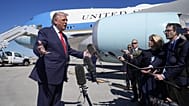Daniel Cohn-Bendit to Recep Tayyip Erdogan: Do you still believe that Turkey will enter the European Union? I have the impression that you don’t believe it any more.
Erdogan to Cohn-Bendit: If you take us in, then we will accept it.
Cohn-Bendit: Yes, but you know, to get in, it is a common effort. I would agree that a part of Europe doesn’t think like this.
If Turkey’s Prime Minister Recep Tayyip Erdogan is untalkative about his country’s candidature to become an EU member, Daniel Cohn-Bendit might be one of its best Janissaries. The co-president of the European Parliament’s Green group was in Istanbul recently, to try to reanimate the adhesion process, which has been showing signs of running out of steam. Yet the Greens still feel Turkey has a full place in Europe. euronews interviewed Cohn-Bendit in Istanbul.
Christophe Midol-Monnet, euronews: Daniel Cohn-Bendit, glad to have you with us. We’re here on the bank of the Phosphorus. From here, what allure does Europe hold?
Daniel Cohn-Bendit, MEP, Greens/European Free Alliance: Let us say that Europe is not entirely understood from here. That is to say: there was a lot of hope in Turkey, in part of Turkey, for the adhesion process, and now there’s the impression that Europe is blocking Turkey, and so, in reaction, Turkey is not as tempted by Europe, which is not good.
euronews: It is known that you are favourable towards Turkey joining. Do you consider yourself a rare species, on its way out.
Cohn-Bendit: Let’s say that, for the moment, those defending the membership view are in a minority. Not so much a disappearing species but a threatened one. But I believe that if one sees the importance of Turkey today, diplomatic importance, economic importance, Europe has to ask itself a pile of questions, because ties between Europe and Turkey are more and more interlinked. And we can’t get out of the process simply by saying ‘no’. So, I believe that the future will show that Europe needs Turkey and that Turkey needs Europe.
euronews: But politically, the gap between public opinion and the political classes is widening, also.
Cohn-Bendit: I believe yes, at least right now. But I believe that when we see the work we have ahead of us, which is to say the Middle East problem, the problem of negotiations with Iran, Turkey needs support in Europe and the United States in order to continue to play its role. This role is recognised because there is a negotiation process with Europe. If this process was cut, Turkey could not play this role. So I believe that we’ll come back in the coming months to, let’s say, a much more peaceful climate than exists today.
euronews: But the negotiations for adhesion are at a standstill.
Cohn-Bendit: The adhesion negotiations are at a standstill, so what has to happen is… Well, now, in June there are going to be elections in Turkey. But I believe the Cyprus problem has to be settled. Cyprus in fact is no longer important, but at the same time, it’s a huge obstacle. So, there has to be a push to open negotiations, let’s say so there can be direct economic exchange with northern Cyprus. For that, Europe has to push to open the north’s sea and airports. Then the Turks will open Turkey’s sea and airports to the Greek Cypriots. Turkey has to make an effort by setting an agenda to reduce troop numbers in northern Cyprus. That can be settled if there is a political will. Our role is to push for that will.
euronews: How do you personally convince a citizen of the need for Turkey’s adhesion?
Cohn-Bendit: First the politicians have to be convinced. The citizen has to be shown that today, seeing the globalisation of trade, globalisation of economies, a powerful Europe regulating the economy, regulating ecologically, needs Turkey. And that for the conflicts we have with some Muslim countries, with radical Islam, etcetera, for the conflict in the Middle East, Turkey can give us an advantage that we need. This is how we have to try to convince people.
euronews: Do we also have to get rid of fixed ideas about the veil?
Cohn-Bendit: Turkish women don’t wear veils. They wear a headscarf. French women 50 years ago wore a headscarf, in the countryside. So, it’s not a veil. They are not veiled. They have a headscarf. But I believe that the problem is not the scarf, it’s what’s inside the head. It’s… Do we have a secular state? And the debate in Turkey on the next constitution, which will have to be formulated after the elections in June, will be fundamental. A state that protects all the freedoms of individuals, freedom of belief, freedom of non-belief, freedom of sexual orientation, which is in the European Charter of Fundamental Rights. That is the future of Turkey, with or without the headscarf, and not the veil. No one is veiled in Turkey.
euronews: We seem to be in the trough between waves in the story between Europe and Turkey. Can this start up again, and if so, when?
Cohn-Bendit: Listen, I don’t have a crystal ball. But, evidently, it will get going again. It will because common interests and mutual implication are too deep. When? I don’t know. But our political activity has to be reinvigorated so that negotiating chapters are reopened, that laws in Turkey, for example laws about unions, that laws are decided by the parliament. And after the next elections in June there will be a veritable constitutional opening up in Turkey.















